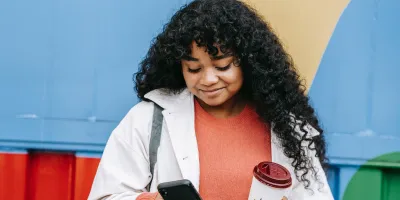
Ever had that feeling that there is something 'off' about a situation or person for no apparent reason? Or that deep sense of knowing in your belly? The gut is often called the 'second brain' and by tuning in to it, we can learn a lot about ourselves and our relationships, explores Journalist, Rosel Jackson Stern and Relate Counsellor Holly Roberts.
I’m sitting on my computer, anxiously hovering the cursor over the send button on my email. For the past hour, I’ve been going back and forth on whether I should quit art school and this email is the final step in the decision. The course I’m attending is fine but I can’t shake this lingering sense that I’d be more fulfilled elsewhere. I’m getting a steady source of funding learning about art, which I love. I fought to get this spot but now that I’m here, I just have a gut feeling that I should quit. Rationally, this seems crazy and I leave the message unsent in my draft inbox.
Later, while on the phone to a deeply intuitive friend, she senses that somethings up and asks what’s on my mind. I explain the situation and she replies: “Go with your gut. You will be ok.” That night, I sent the email.
According to the Harvard Buisness Review, there is a reason why scientists call the gut the second brain: “There’s a vast neural network of 100 million neurons lining your entire digestive tract. That’s more neurons than are found in the spinal cord, which points to the gut’s incredible processing abilities”. So when you have a gut feeling about something or someone, chances are that it’s worth paying attention to.
There’s a lot of interference
Trusting your gut can feel scary. We are bombarded with information every day about what we should wear, do for a living, listen to, watch and who we should be friends with. We’re taught to outsource our decision-making or consider what makes “the most sense”, whatever that means. “One of the biggest barriers to trusting your gut is having a negative sense of self,” says Relate Counsellor Holly Roberts. “This means believing things like: “I’m not worthy, I’m stupid” etc. can disconnect us from tuning in to even the most basic needs like hunger and tiredness.” Most of us encounter this to varying degrees. “If you struggle with anxiety, it can be really hard to allow yourself to feel anything at all,” Holly explains.
So, how do we tell the difference?
Holly emphasises the importance of sensing each decision in your body, physically linking it to a sensation. It might be tightening in your chest, a roar in your stomach or moisture on your palms. “To listen to ourselves is a huge act of self-love”, she reflects when we speak on the phone on a cloudy summer afternoon. Starting small with decisions that have minor consequences can help us discern our gut feelings while keeping the stakes low.
“When we’re trusting our gut, the decision doesn’t feel complicated,” Holly says, “It feels really grounding.” This sense of knowing might be unfamiliar at first. This is a muscle that needs to be trained and practised like any other. Holly recommends using grounding techniques to help us tune in rather than tune out.
When I finally quit art school, I felt a huge sense of relief. Now looking back on it, it was the best decision I could’ve made even if I was scared at the time. In the moments before I sent that email, I had to feel the floor beneath my feet, take a deep breath and let the answer arise by imagining that I’d be ok either way. Then the answer became really clear.
In her work as a therapist, Holly uses somatic tools in her sessions with clients. “A counsellor can notice what happens to your body as you’re talking about your emotions”, Holly explains, “they can stop you mid-sentence and say: ‘check in with your body to see what’s happening here’ and you can get out of your head and notice what happens when you’re speaking about a certain topic.” Not all therapists work this way, but it’s a useful strategy to break the narrative we create about the difficult life choices we’re faced with. Having someone observe us can really help to be with challenging feelings.
Why is it so scary?
Often it’s not that we don’t know how to listen to ourselves, but that we fear the consequences of doing so. We are relational beings and so it’s natural to care about what other people think. The more we honour our gut feelings with our actions however, even in the small moments like choosing what we’re eating for breakfast, the more confident we become.
Decisions carry different stakes and it’s important that we prioritise our safety first. To live authentically, to live in alignment with what our bodies are telling us, means that we will disappoint others. And that’s ok. In those moments, it’s about reminding yourself that you’ve made a decision from a place of love. Once we begin to listen to our intuition, we access a fantastic amount of agency.
“Learning breathing techniques can make us feel more in control of our bodies”, says Holly, “when you see that work, it creates a sense of power because you’ve managed an uncomfortable feeling.”
I’ve found that trusting my gut has been a great way to assess the quality of my relationships. People who love and support me might not understand the decision I’m making, but ultimately they want me to honour what I feel inside. They’re interested in my authenticity, more than they are in my life making sense to them. Either way, the benefits of trusting your gut is the possibility of a life lived for oneself, a worthy gamble if ever there was one.